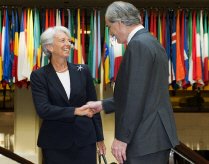
Typical street scene in Santa Ana, El Salvador. (Photo: iStock)
IMF Survey: Lagarde Hits Triple C in Reenergized Agenda for IMF
July 6, 2011
- Global recovery remains uneven, with unemployment too high in some advanced economies
- IMF must keep track of growing interconnectedness of global economy
- Lagarde wants to see improved governance, diversity at the Fund
Christine Lagarde, taking over as new Managing Director of the IMF, outlined a five point agenda for reenergizing the Fund to ensure the 187-member country institution remained pivotal to the global economy.

First Deputy Managing Director, John Lipsky, congratulates the new head of the IMF, Christine Lagarde during her first day at work (photo: IMF)
IMF’s WORK PLAN
The world faced problems of mounting sovereign debt in some advanced economies, while emerging markets faced the risk of overheating and possible inflation that was also threatening some low-income countries.
“We are facing a landscape that is in better shape than two years ago, but clearly with an uneven process of recovery,” said Lagarde, who took up her new job on July 5.
The former French finance minister outlined three categories of issues facing the IMF and the global economy and two sets of issues to enhance the effectiveness and operations of the Fund. The three external issues each begin with “C”:
• Connectiveness: The IMF must keep track of the growing interconnectedness of the global economy and warn about possible spillovers from one economy to another. “We have seen during the crisis that all countries, all sectors, industries, services, finance were highly connected with each other, and amongst themselves. And, we need to address that interconnectiveness.”
• Credibility: For the Fund to be credible, its analysis and work needs to be candid, credible, and evenhanded. “There is no one category of country that deserves special treatment, and another one that will receive harsh treatment. ‘Evenhandedness,’ ‘level playing fields’ are words that you will hear me say over and over.”
• Comprehensive: The IMF should look at a country’s economy not only by traditional macroeconomic measures, such as fiscal deficits. Other factors such as employment and social issues need to be taken into account as well.
The IMF should work with other international institutions, such as those that specialized in labor or trade, she said.
Turning to the way the IMF is run, Lagarde said she wanted to enhance the legitimacy and diversity of the institution that was founded in 1944.
• Legitimacy: Lagarde said the IMF’s members must complete 2010 reforms designed to improve the Fund’s governance and provide major emerging markets and low-income countries with a greater say in the institution.
• Diversity: As the first female head of the IMF, Lagarde said diversity was not just about gender. “It is about engaging, about breaking down the barriers, removing the obstacles, so that all participants can actually be at the table. And that touches on gender. It touches on geographical origin. It touches on culture. It touches on academic background.”
Lagarde, a former head of international law firm of Baker & McKenzie, praised First Deputy Managing Director John Lipsky, who ran the Fund after Dominique Strauss-Kahn resigned, describing him as a “fantastic advocate, spokesperson, person of substance, and a person of charisma and joy in the last few weeks.”
The aim of the Fund, she said, was to help restore the stability of the global economy in the wake of the worst economic crisis since the Great Depression, “to help restore stability where there is instability, and there is plenty of that around; to help make sure the economies of the world work better to provide a better welfare for people.”


